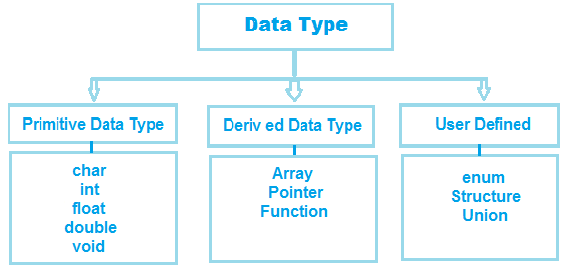Data Types in C with Examples
Data types are used to define the type of data that a variable can store to perform a specific operation.
ANSI C provides three types of data-types.
- Primary Data Types
- Derived Data Type
- User Defined Data Types

Primitive data types:
| Void |
It holds no value and generally used with function. |
| Int |
It is used to denote an integer type. |
| Char |
It is used to denote a character type. |
| float, double |
It is used to denote a floating point type. |
| int *, float *, char * |
It is used to denote a pointer type. |
Primitive data types are used to hold the maximum value. Every C compiler supports five primary data types:
Example:
int a=90; // valid
a=90; // invalid
Derived Data Type:
Derived data types are derived from fundamental data type. Variable of derived data type allows us to store the value of the same time in one variable.
C supports three derived data types:
| Arrays |
Arrays are sequences of data items that have homogeneous values and adjacent memory locations to store values. |
| References |
Function pointers allow referencing functions with a particular signature. |
| Pointers |
It is used to access memory and deal with their addresses. |
|
|
Example:
int mark[5]={10, 20, 30, 40};
int *a;User Defined Data Types:
The user-defined data type is used to store multiple values. There are various user-defined data types are given below in the table.
| Data Types |
Description |
| Structure |
The structure is a package of variables under a single name. The “struct” keyword is used to define a structure. |
| Union |
It is used to store the various data types in the same memory location. |
| Enum |
It consists of integral constants and each of them is assigned with a specific name. It is defined as “enum” keyword. |
Example:struct student
{
int id;
char name[10];
float mob;
};
C Data Type with size Let us consider an example to find the memory size of data type:
#include
int main()
{
int a;
char b;
float c;
double d;
printf("Storage size for int data type:%d \n",sizeof(a));
printf("Storage size for char data type:%d \n",sizeof(b));
printf("Storage size for float data type:%d \n",sizeof(c));
printf("Storage size for double data type:%d\n",sizeof(d));
return 0;
}
| Data Types |
Memory Size |
Range |
| char |
1 byte |
?128 to 127 |
| signed char |
1 byte |
?128 to 127 |
| unsigned char |
1 byte |
0 to 255 |
| short |
2 byte |
?32,768 to 32,767 |
| signed short |
2 byte |
?32,768 to 32,767 |
| unsigned short |
2 byte |
0 to 65,535 |
| int |
2 byte |
?32,768 to 32,767 |
| signed int |
2 byte |
?32,768 to 32,767 |
| unsigned int |
2 byte |
0 to 65,535 |
| short int |
2 byte |
?32,768 to 32,767 |
| signed short int |
2 byte |
?32,768 to 32,767 |
| unsigned short int |
2 byte |
0 to 65,535 |
| long int |
4 byte |
-2,147,483,648 to 2,147,483,647 |
| signed long int |
4 byte |
-2,147,483,648 to 2,147,483,647 |
| unsigned long int |
4 byte |
0 to 4,294,967,295 |
| float |
4 byte |
1E–37 to 1E+37 with six digits of precision |
| double |
8 byte |
1E–37 to 1E+37 with ten digits of precision |
| long double |
10 byte |
1E–37 to 1E+37 with ten digits of precision |

